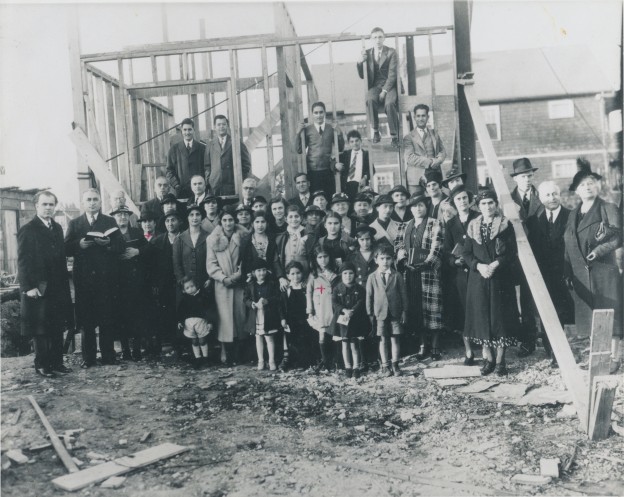
The congregation of the Armenian Brethren Church circa 1938.
Our family attended the Armenian Brethren (Evangelical) Church on Arlington Street, in Watertown, Massachusetts. My grandfather, Levon (Leo) Kricorian, was one of the founders of the church. Its congregation was made up of survivors—and the children and grandchildren of survivors—of what was called at the time “the Massacres,” “the Deportations” or “the Catastrophe.” Later this tragic chapter in Armenian history became known as The Genocide (1915-1921).
The Genocide was only occasionally openly addressed in our community, but vague allusions and scraps of stories floated around me without my ever gathering them into a coherent narrative. One of these fragments was a line that my grandmother said in passing about one of her close friends, Mrs. Mary Amiralian. In reference to Mrs. Amiralian’s grown progeny, one of whom was my Sunday school teacher when I was in grade school, my grandmother said, “Those are her American children. The first ones died in the desert.”
Years later, after my grandmother and Mrs. Amiralian had died, when I was researching my novel Zabelle and reading voluminously about the Armenian Genocide, this bit of conversation came back to haunt me. In response I wrote the poem “Ghost Children.”
Ghost Children
At lunchtime I stand
at the stove spooning soup
into three white bowls.
My children eat bread
at the table. They laugh
at the milk moustaches that
I wipe from their faces.
On the pantry floor I see
the narrow shadows of the
other children, the ones
whose bones I left in the
desert in a garden of bones.
The sand is still in my hair;
their high voices in my ears.
My American children can’t
see their unlucky brother and
sister who follow close by
my skirt. Mairig, the ghosts
complain, we are hungry. Mairig,
give us something to eat.
Published in ARARAT Literary Quarterly (Spring 1995)
Recording of the author reading “Ghost Children” via The Armenian Poetry Project
* Mairig means Mommy in Armenian
Nancy Kricorian
December 1, 2012